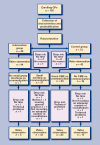Effective improvement of doctor-patient communication: a randomised controlled trial
- PMID: 16882375
- PMCID: PMC1874521
Effective improvement of doctor-patient communication: a randomised controlled trial
Abstract
Background: Doctor-patient communication is an essential component of general practice. Improvement of GPs' communication patterns is an important target of training programmes. Available studies have so far failed to provide conclusive evidence of the effectiveness of educational interventions to improve doctor-patient communication.
Aim: To examine the effectiveness of a learner-centred approach that focuses on actual needs, to improve GPs' communication with patients.
Design of study: Randomised controlled trial.
Setting: One hundred volunteer GPs in the Netherlands.
Method: The intervention identified individual GPs' deficiencies in communication skills by observing authentic consultations in their own surgery. This performance assessment was followed by structured activities in small group meetings, aimed at remedying the identified shortcomings. Outcomes were measured using videotaped consultations in the GPs' own surgery before and after the intervention. Communication skills were rated using the MAAS-Global, a validated checklist.
Results: The scores in the intervention group demonstrated a significant improvement compared with those of the control group (95% confidence interval = 0.04 to 0.75). The effect size was moderate to large (d-value = 0.66). The level of participation significantly contributed to the effectiveness. Largest improvement was found on patient-centred communication skills.
Conclusion: The approach of structured individual improvement activities based on performance assessment is more effective in improving communication skills than current educational activities.
Figures
References
-
- Knowles MS. Self-directed learning. A guide for learners and teachers. Cambridge: The Adult Education Company; 1975.
-
- Davis DA, Thomson MA, Oxman AD, Haynes RB. Changing physician performance. A systematic review of the effect of continuing medical education strategies. JAMA. 1995;274(9):700–705. - PubMed
-
- Davis D, O'Brien MA, Freemantle N, et al. Impact of formal continuing medical education: do conferences, workshops, rounds, and other traditional continuing education activities change physician behavior or health care outcomes? JAMA. 1999;282(9):867–874. - PubMed
-
- Thomson O'Brien MA, Freemantle N, Oxman AD, et al. Continuing educationmeetings and workshops: effects on professional practice and health care outcomes [review] Cochrane Database Syst Rev. 2001;(2) CD003030. - PubMed
Publication types
MeSH terms
LinkOut - more resources
Full Text Sources
Medical
Research Materials

